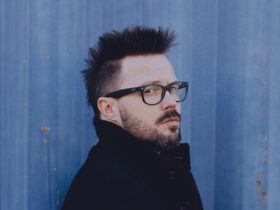Guitar virtuoso Joe Satriani is currently on tour in support of his 14th studio effort entitled “Unstoppable Momentum.” Joe is considered a pioneer on the 6th string and if you listen to his latest release, you will hear why. Joe will be making his way to the area on October 1st for a performance at the Center for the Arts at the University of Buffalo. Before a show in Austin, TX Joe took the time to talk to us and discussed a variety of things. Of course we talked about the creative process for “Unstoppable Momentum.” We also chatted about his guitar collection and what some of his favorite ones are. In addition, we talked about his group Chickenfoot and his big year ahead in 2014 which will include releasing a book and a box set. Enjoy a candid conversation with Joe Satriani.
Gus: We are here with guitar virtuoso Joe Satriani, who is currently on tour in support of his 14th studio album Unstoppable Momentum. He will be stopping by on October 1st, at The U.B. Center for the Arts. This is your highest charting album in over 20 years, congratulations. On the new record once again you play the guitar in a way that pushes the boundaries of the instrument and you break ground in terms of new things and new sounds that the guitar is capable of. How do you continue to stay a step ahead of the pack and set the standards for how well that you play the electric guitar?
Joe: Those are really kind words thank you. Well, I am sort of pushed internally to take risks and try to imagine innovation. It’s a funny thing, you can’t really take claim to innovation because you don’t know until how people receive it. It’s about cultivating a state of mind. I think every time you have success you have to turn the other way and try something else. It seems to be the only way to live a good, productive, artistic life so you don’t get stuck.
Gus: Staying fresh is the key to Joe Satriani’s success. Bringing outside artists in, do you let them have input in your creative process?
Joe: I think you hit on the right idea Gus, you bring in people that are going to push you in ways that are unexpected. You kind of jerry rig the system so that you think well I don’t know what’s going to happen, like I’m going to bring in the greatest drummer in the world and I’m going to see how he reacts. I write the material, it’s very well defined when they hear it, it’s arranged. I put it out to all the players, Mike Keneally, Vinnie Colaiuta and Chris Chaney to see how they want to interpret this. Let’s do eight different takes and each time, feel free to change your mind. That’s what we did every day, we hear a piece of music at 11am in the morning and by noon we start doing takes, by 3 in the afternoon we have a variety of impressions from all the musicians. I would sit back and say wow, I like 6 or 5 or 3 or whatever it might be and we would just go from there. I would pick the ones that were different from what I had imagined. That was key for keeping me on my toes and pushing my personal creative envelope, my technical envelope. That’s the key, get great musicians in and give them the freedom to interpret your material.
Gus: You also had Mike Fraser co-produce, what does Mike bring out in you that maybe some other producer might not be able to?
Joe: I have been working with Mike on quite a lot of records, we probably did over 10, a variety of studio projects, my solo efforts as well as Chickenfoot records, a lot of live show DVDs and saturated films. We’ve got a great working relationship; he’s got a fantastic set of ears on him and has a natural way of handling the total spectrum coming from every instrument. He’s really good when he has to deal with a crazy bunch of guys, rock- n- roll musicians bouncing off the walls. He has a way of making sure we get everything done. He’s creative and very supportive of chasing down crazy ideas that people bring up. I’ve seen him do great work with Sammy Hagar when we’re working on Chickenfoot records. It takes a lot of leaps of faith when you do instrumental music, you have to chase down some crazy ideas to get the songs to really pop. He’s such a pro, he always delivers.
Gus: Talking about the creative and writing process, do you maintain a certain theme for each album or is it a totally organic feel, how do you get there?
Joe: That’s a bit of a mystery. I learned at an early age that when you feel creative you have to chase that little spark down, documenting it any way you can, on a napkin, whisper it into your I-phone or else if you’re lucky enough to be around an instrument or recording device then record it. Creativity is fleeting and you really can’t take credit for it. It just comes to you, but your discipline is really the key element in chasing that idea down and developing it and turning it into something that you can share with other people. In that way my creative process has not changed since I was a teenager. I get inspired about a memory or something that just happened or a person, a place, a picture, a movie, a bird flying across the sky and I just run with it. I try to develop it as much as possible and I try to retell it to my audience using every musical tool I know. I think that ultimately when you make a record you have to figure out which songs go together well. It might be a group of songs that are very different from each other that compliment each other or some records have a different kind of cohesiveness where you take a bunch of songs that are very much like each other and make the record more fun to listen to, more interesting. You have to take it record by record.
Gus: What was your inspiration for the song, Three Sheets to the Wind, as it kind of strays off the beaten path from the rest of the album?
Joe: It started off pretty innocently; I had this very strong melody that I had written on guitar and it was too strong, it sounded like the six strings were pulling the impact of the melody down. I taught myself how to play it on keyboard, organ, piano and made a couple of demos at home. If this was the 60’s and I was hanging out with George Martin and the Beatles we would play whatever we wanted so I thought forget about being the vision people think, I’m just some kind of guitar shredder. What if I was just in a band like the Beatles? We would feel more free to associate our arrangements with the true possibility of the music rather than our image. I thought, what is my head telling me? Well the melody would sound great with a horn section. It would be great if the song went from being this happy thing and when the solo came it went completely crazy and changed its nature. At the end somehow it picked itself up, dusted itself off and became the horn song again. I thought I would try to do that. By the time I brought it into the studio all the musicians looked at me and said what is this song about? It’s about a dapper guy in a tux who goes out with champagne for a night on the town and has some wild adventures; somehow as the sun comes up he ends up back on his doorstep safe and sound but still a little tipsy. That’s the image of the song and you guys have the creative license from me to play up the jaunty parts and also the dark parts. It was a fun song to work on; it really was a lot of fun.
Gus: I’m assuming you have a vast guitar collection. What guitars did you use to make Unstoppable Momentum?
Joe: I did have a pretty big collection I’m an avid collector of vintage guitars but I have thinned the herd every couple years. On this record I didn’t use a whole lot like on some others. Every once in awhile you do a record and you use 5 guitars and that’s it; it’s at that moment that you think you need something different. I used mainly my 24-10 MCO prototype guitar that is now a model that Ibanez puts out and I used the previous model that’s called the JS 2400. Those are the main two guitars that have done the lion share of the work. I think a small appearance of my 58 Fender Esquire and there might be a 335 showing up for about 8 bars; my Les Paul and a Fender electric 12 that show up for about 4 bars or something. I like to make them as different as possible. I might have one of my JS guitars with a vibrato bar set up on one side maybe on the right channel; left channel I may use an old Fender and for the center maybe my newest JS 2410. If it has harmony parts for the melody I may pick something very unusual like an old Ibanez prototype or a vintage Stratocaster or a 53’ Les Paul, something that would sound so different that it would give the track depth. I think that is what helps with guitar records. If you’re looking at 10-11 songs, and you did every track with the same guitar and amp it would just bore you to death after a while. I like different textures. I grew up listening to classic rock and I always loved those bands when one guy was a Tele guy and one guy was a Les Paul guy and one guy was the Strat guy. Every song had textures that you could focus on if you wanted to. They were distinct and they did their job in their unique way. It always made records more interesting to listen to.
Gus: What is your most cherished guitar?
Joe: Well I tend to force myself to get close to new guitars. After about 4 or 5 years I retire the guitars that I have been working on a lot on records and tours. I just say I’m going to leave this guy at home and take this new guitar out on tour and beat it up and see what it can do. I guess my newest guitars are the ones I really like the most. The first orange prototype for the 2410 MCO, I still really like that guitar, that’s the one that convinced me that putting up a Bubinga stripe in the neck and changing the wood from bass wood to alder was a good idea. I still feel good when I pick that one up every night. I’m liking my Chickenfoot 2400 guitar that still has a very unique tone to it. I guess its the ones you will see me play live, those are the ones I like the best right now.
Gus: Speaking of Chickenfoot, there were recent photos of you and Chad and Sammy having dinner together. What’s the status of Chickenfoot and the future of the band?
Joe: I’m hoping to inspire the guys to get together maybe in January to start working on another record. When I got a day off on tour I start working on some Chickenfoot ideas. I hope I can have an albums worth of tunes to send to those guys by December so they can think about which songs they want to do, then we’ll get together and have a party like we usually do and make a record.
Gus: In your amazing career, you had 15 Grammy nominations and not one winner. Do you ever feel like you are the “Susan Lucci” of the Grammy awards?
Joe: I haven’t heard that one in awhile and you know she eventually did win. I’m not the biggest loser (laughs), there is another guy out there and I think he’s a jazz musician who’s been nominated far many more times than myself and has yet to win. The lucky stroke for me is they eliminated my category altogether so now I can’t lose (laughs.)
Gus: A good way to look at it with a positive spin. After 14 solo albums, have you thought about doing a culmination of your entire career and maybe release a box set of some sort?
Joe: A lot of things are planned for next year to coincide with a book that I’m releasing called, “All the Strange Beautiful Music,” which will basically chronicle every single recording I’ve ever made and cover all the artistic and technical natures of it. Coming out alongside that book Epic Sony will release a very unusual boxed set that is basically every song I’ve recorded and released as a solo artist, completely remastered and have some alternate mixes and unreleased tracks. So next year will be very interesting in terms of looking back and solidifying the entire output of my solo career.
Gus: The book, is it a biography or a teachers guide book to the songs?
Joe: We’ve called it a musical memoir. I didn’t feel it was time to do that autobiography tell all kind of thing. (laughs) I figure I’m still out here kicking up the dust every night so I figure I’ll wait another ten years for that. The publishers and the writer Jake Brown approached me with the idea of doing a musical memoir so it’s a short biography but what it really does is focus on every song that’s been recorded for each of the solo albums right up to the current record. It contains not only all of the interviews that he did with me, telling some of the behind the scenes stories about the records, but he interviewed every single musician, engineer, producer and co-producer to get a unique insight into how the record was made. There is going to be the broad story as to what was happening around the record, the drama and all that kind of stuff, as well as, where did you put that microphone, what kind of recording baskets; its sort of like a very interesting approach that will really make the fans happy because it will fill in lots of blanks and tell the full story without speculation.
Gus: Out of all the young guitarists around such as Gary Clark Jr. or Tyler Bryant, who do you really like currently?
Joe: Gary is great, I always love it when you can get guitarists on the scene that can sing and have a really creative approach, to not only writing but performing. I’m attracted to that element, the performance element. When Jack White came out I was very excited about that because he’s very artistic, a great performer, he takes chances and works in a very unique original style. There is this band called Animals As Leaders, a guitar player named Tosin Abasi. He is a great player and he is doing stuff that no one else is doing. I think that’s really great. This week I’ve been listening to Queens of the Stone Age a lot. I know they’re not new, Josh is not a new guy on the scene. I still think he is taking guitar into some new areas. He’s just such an unusual player, a great singer and just an amazing lyricist. There’s a lot to like out there, from new players and those who have been established for a while. It’s a great time to be a fan.
Gus: We would like to thank you Joe on behalf of BackstageAxxess for taking the time to talk to us.
Joe: No problem. See you soon!
We would like to thank Melissa Dragich-Cordero from MAD Ink PR for setting up the interview with Joe.
For more information on Joe Satriani, please go to: Joe Satriani. If you looking for the most up to date information on Chickenfoot, please go to: Chickenfoot.
To purchase tickets to see Joe Satriani along with Steve Morse at UB Center for the Arts on October 1st, please go to: Purchase Tickets Here.







